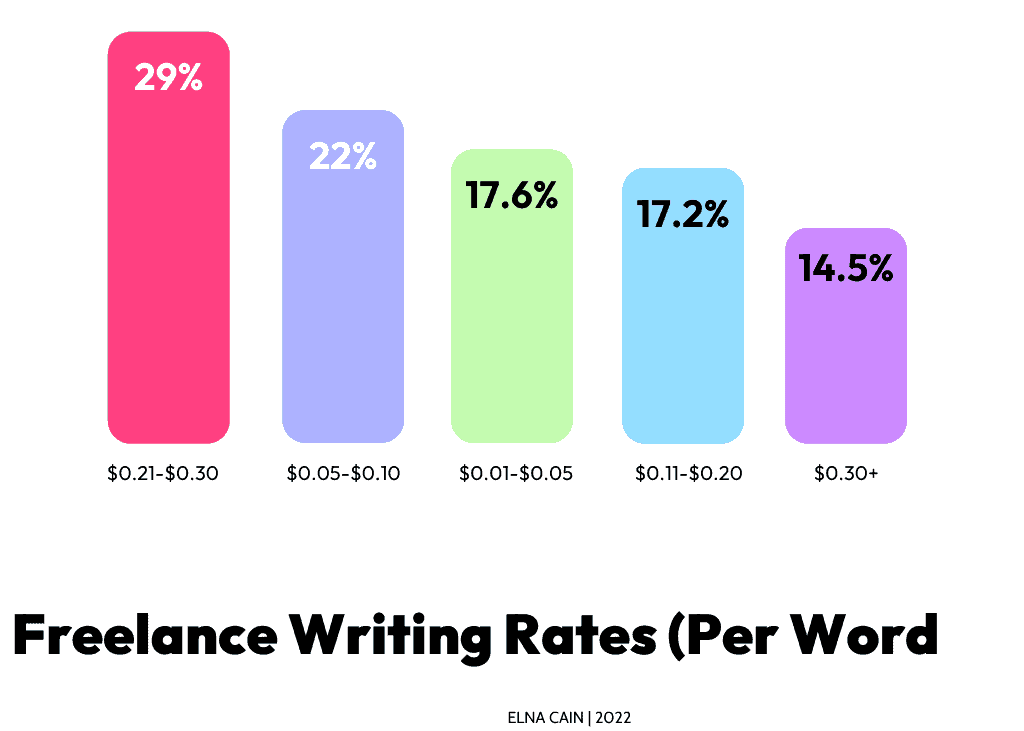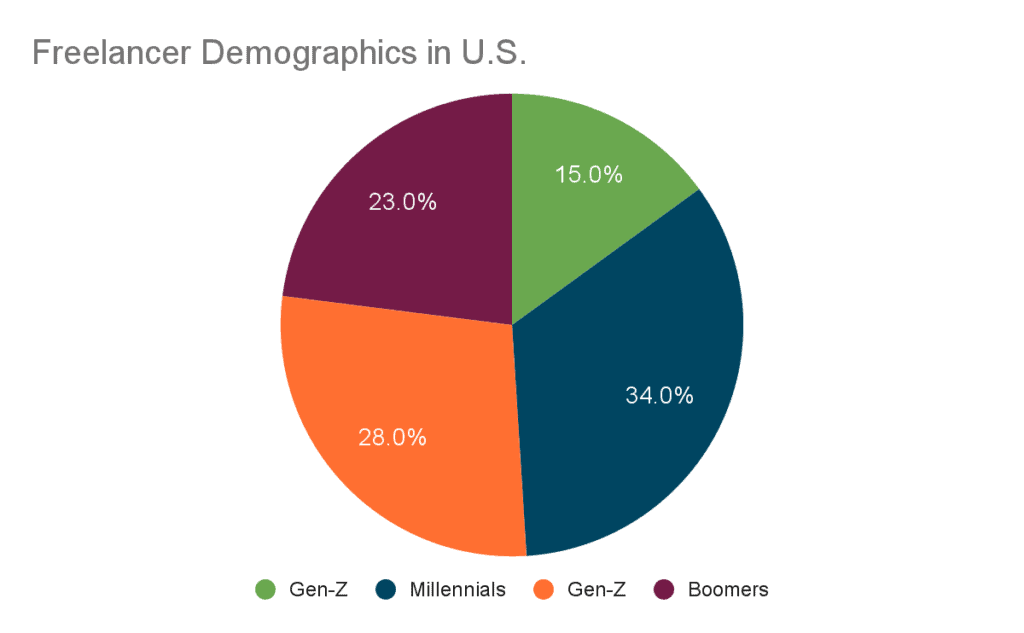There are an estimated 76.4 freelancers in the US, and up to 82% of these are freelance writers. If you're looking to start your freelance writing career, read this guide for the best tips and tricks.
Key takeaways
- Start freelancing alongside your day job to build financial security and save four to six months of expenses before going full-time.
- Leverage your existing network first for gigs rather than racing to the bottom on low-paying platforms like Fiverr.
- Specializing in a specific niche over time lets you charge higher rates and become a go-to expert clients trust.
Do you ever think about how you want to start something but then give up, thinking, “It’s probably too late because everyone else is already doing it?” Well, it’s not.
And it’s not too late to become a freelance writer in 2026. In fact, it’s a great time to do just that.
Whether you want to complement your 9-5 income by earning some extra money, or you want to test the waters of freelance writing as a side hustle before you go all in—this article will answer all your questions and more.
The rise of freelance writing as a career path
As reported by Exploding Topics, there are an estimated 76.4 million freelancers in the United States as of 2024. This figure has grown year-over-year by at least two million since 2017. And data suggest that by 2028, there will be over 90 million (yes, million!) US freelancers.
Freelance writing is one of the most popular self-employment paths; Zippia data shows 82% of freelancers in the United States are freelance writers. As more companies shift to remote work and digital platforms, the demand for quality content is skyrocketing. Writers no longer have to be tied to a single company or location to make a living. Instead, they’re building flexible careers on their own terms.
Income for freelance writers varies by the niche, specialization, and type of work you do, but a 2022 survey showed some of the common ranges for per-word pricing (and indicated that almost half are earning $0.21-0.30 per word or more!) Plus, with modern AI tools, you can scale up your freelance business to do more with less.

How to get started as a freelance writer in 2026
If you’ve decided to dive into freelance writing in 2026, here’s what you need to do to ensure you’re setting yourself up for success (without getting stuck in the weeds.)
Start before you feel completely “ready”
Are you scared that you’re not ready to become a freelance writer? Here’s the harsh truth: You’ll never feel completely “ready.” That’s why the best time to start is now. Guess what? Even the freelance writers you look up to and admire didn’t have everything figured out before they started.
From launching a professional website to nailing a powerful value proposition for clients, you can piece together those elements and iterate along the way. In fact, it’s usually better if you do. Freelance writer Ashley Cummings said a good first step is to get yourself in the know. “Subscribe to industry newsletters and blogs,” she said. “Stay on top of trends because things are changing at lightning speeds these days.”
Here’s the thing: your freelance writing business will grow and change over time. As you dive into different topics and experiment with various writing styles, you’ll figure out what makes you want to jump out of bed and hit the keyboard daily. Your website, branding, and value prop will get sharper and more polished as you go…because you’ll learn what works and what doesn’t.
Give yourself a financial runway
Deeping your toes into freelance writing doesn’t mean you should immediately turn in your notice at work. Before you do that, cut your expenses and pad your savings account. Try to save up at least four to six months of living expenses (although more will never hurt) before striking out on your own.
When freelancing part-time, you have the security of your full-time paycheck plus the extra cash from your writing side hustle. The idea of not having a predictable income stream might seem terrifying.
That’s why, instead of feeling overwhelmed by all the uncertainty, you can start with freelance writing alongside your day job, and build a financial runway to support you when you’re ready to switch to full-time freelancing.

Reach out to your network
Now it’s time to address the looming question: Where to start? A good idea is to work with what you already have. Contact your network (your LinkedIn following, your email contacts, friends and family, etc.) and put out an ask seeing if anyone you know needs a freelance writer.
Note: You may be tempted to take on low-paying gigs on sites like Fiverr or Upwork, but keep in mind that sites like these are often a race to the bottom when it comes to making money.
Freelance writer Rochi Zalani also recommends finding someone in the niche you’re interested in who can take you under their wing in the early days. “I'd advise subcontracting for more established freelancers in the beginning,” she said. “It helped me SO MUCH! You can learn from their systems, see how they edit the final piece without the burden of ruining an editor/client relationship, and test the waters.”
The key is to stay active. Be yourself on social media, but also be intentional with what you post and who you follow. Participate in relevant conversations within your chosen community. Make friends. Promote fellow writers’ work. The kindness will come back around.
Connect with other freelance writers
Speaking of your fellow freelance writers: there are many other freelance writers out there who know exactly how you feel and who went through the same process before becoming full-time, self-employed writers. That’s why building relationships with other freelancers is crucial.
Not sure where to begin? On Whop, you can find plenty of communities for freelance writers, like EarnForWriting.

Fellow freelancers will help you find more work opportunities, hone your skills, and give honest advice as they’ve been in the trenches and know what it’s like when you’re starting out.
That said, don’t get distracted by what everyone else is doing. “Find what you love to do and stay focused on that,” said Laura Leiva, a freelance writer.
Find gigs
Every gig is a stepping stone, so you must get the ball rolling. First things first: master your craft. Whether you’re writing blog posts, copy, or even product descriptions, the better you are at what you do, the easier it’ll be to land gigs. So, get your hands dirty—write, rewrite, and refine. Digital resources like courses, blogs, and YouTube channels can help you level up.
Next up, build a strong portfolio, invoicing system, and a personal website. This will be a professional hub for your business, and a place for you to showcase your work. Start with spec pieces, guest posts, or even volunteer work to fill it up. It’s all about proving you can do the job.

While you’re at it, get out there and network. Attend events, even virtual ones. Connections are key, and face-to-face (or screen-to-screen) interactions can open doors you didn’t even know existed.
But don’t just wait for the magic to happen. Pitch your dream clients—the ones you’ve been stalking on LinkedIn. Reach out to them and offer your services. Along with this, you can always check out different job boards to help you land your first gigs.

Know when it's time to turn your side hustle into a full-time job
So, you’ve got your side hustle running smoothly, and now you're wondering, “When do I make the jump to full-time?” Here are few key signs will tell you when to make the leap.
First, make sure you have a reliable stream of revenue. If your freelance income consistently covers your bills and leaves room for a little extra, you’re on the right path for a profitable online business. But don’t get too excited after a couple of good months. Before quitting your 9-5 job, ensure you’re not just riding a lucky wave.
Next, improve profit margins. If you’re charging higher rates and working smarter (not harder), you’re likely in a place where you can sustainably live off your writing.
Finally, financial freedom. If freelancing covers all your living expenses and you can still breathe easy, that’s a strong signal it’s time to turn your side hustle into a full-time job. Just make sure you have a solid cushion in savings so you’re not stressed in the first few months.
Next up: Go all-in on specialization
What’s the next step in your evolution as a freelance writer? Going all-in on specialization.
When starting, it feels safer to cast a wide net and try every type of writing—blog posts, case studies, website copy, social media posts, emails, product descriptions, you name it. And even writing for different industries.
But here’s the thing: specialization is where the money is. You don’t have to specialize from day one, but eventually, narrowing down your focus will help you stand out and earn more.
Start broad, then narrow down
In the beginning, you have to get a feel for what you enjoy and where your strengths lie. So go ahead and try everything. Write about travel, health, finance, sports, tech, and whatever else sparks your interest. You’re figuring out your voice, honing your skills, and building a portfolio that shows you can handle a variety of topics.

But once you’ve gained experience, it’s time to start looking for patterns. What writing topics or types excite you to sit down at the keyboard? Thinking about this will help you pick a lane and specialize.
Raise your rates over time
When you specialize, your rates go up. The reason? You’re no longer just a generalist—you’re a go-to expert in your niche.
The more you know about a specific industry or type of writing, the more valuable your services become. As you gain more experience and develop a more substantial portfolio in your chosen area, increase your rates accordingly.
Provide more value, and don’t be afraid to charge for It
Specialization also means you can provide more value to your clients. You’re not just writing any article or any blog post—you’re writing something that’s informed by industry knowledge, market trends, and a clear understanding of the target audience.
This is where you can go above and beyond, offering insights that a generalist writer simply can’t.
Mistakes to avoid
Let’s talk about some classic mistakes that can trip you up when you’re starting to specialize:
- Tying up time with projects that don’t serve you
If you’re spending hours on a project that doesn’t align with your niche or long-term goals, you’re wasting time.
It’s much better to spend that time refining your craft in a specific area or working with clients who align with your specialization. - Investing time into someone who’s not ready to hire you
Another trap to avoid? Working with people who aren’t ready to pay for your expertise. If someone is on the fence or doesn’t value what you bring to the table, you’re better off walking away.
Focus on clients who get what you’re offering and are willing to pay for it. - Working with anyone willing to pay your rates
Clients who don’t fit your niche are often more demanding, pay lower rates, and may not fully appreciate the value of your work.
The best clients are the ones who are looking for your specific expertise. They know exactly what they want, and they trust you to deliver it. If you’re working with people who don’t value your specialization, it’s time to move on. - Taking clients who aren’t in your niche
If you’re always chasing different industries or types of writing, you’ll never build the reputation you need to charge premium rates. Stick to your lane, build your expertise, and become the go-to writer for that niche.
Diversifying your business
Once you reach a certain stage in your freelance writing career, it’s time to diversify your business.
The increase of individuals who earn by doing what they love has paved the way for a new era of entrepreneurship. The rise of the creator economy has helped creatives make millions by producing and distributing content across digital platforms to promote products or services to their audience and monetize their efforts.
Digital products gained a strong foothold in the creator economy as a great way to provide creators with an additional revenue stream or source of passive income. Creators started building online courses, ebooks, communities, live streaming, newsletters, etc.
This is a great monetization strategy for freelance writers because it allows them to create an asset once and keep earning for a long time afterward. Building a strong freelance writing career gives you a solid foundation to create digital products, paid courses, or communities, and instead of trading hours for dollars, you can earn while you sleep. Make money teaching other freelance writers how to make money.
Ready to start capitalizing on your skills? If you are looking for ways to sell your digital products but you’re still not sure what the best marketplace is, check out Whop. Building your store takes less than 10 minutes, so sign up to Whop and start selling your digital products today.
Why you should become a freelance writer in 2026
The freelance economy is booming, and the opportunities are better than ever. If you’ve been considering making the leap, let’s break it down and see why now might be the perfect time to try.
First, let’s look at the numbers.
According to Exploding Topics, 59 million people, or 36% of the US workforce, are already classified as independent workers. Moreover, globally, nearly half of the workforce (48.1%) is self-employed, according to the World Bank.
Numbers show that freelancing is no longer just a side hustle for nomads. It’s a long-term, sustainable career.

Now, here’s where it gets really interesting. Out of those full-time freelancers, one in five is pulling in a six-figure salary—$100,000 a year just from freelance work, according to Forbes. This is proof that the traditional 9-5 job is not the only way to achieve hefty income goals.
If we scratch beneath the surface, we can see that people want flexibility. Data from Exploding Topics shows that for almost half of the freelancers (49%), being able to control their own schedule is one of the top reasons for freelancing.
The gig economy has made this possible. People want to work from anywhere, at any time, and do what they’re passionate about. Freelance writing offers all of that and more.
Gone are the days when you had to work a boring desk job to make a living. As more businesses shift to remote work and digital platforms, the demand for content continues to rise. Companies need blog posts, social media copy, email campaigns, and white papers to keep their brands visible—and they need writers to deliver it.
For writers, this means a huge opportunity. The barriers to entry are low, and the upside is massive.
Start your freelance writing career with Whop
Ready to kick-start your freelance writing career? You just need a solid portfolio, a strong pitch, and the determination to get started.
The best part? You can work with clients from all over the globe. With millions of other independent workers paving the way, it’s a golden age for anyone who wants to jump in.
Join Whop, create your online hub, and start selling your freelance writing services today.


